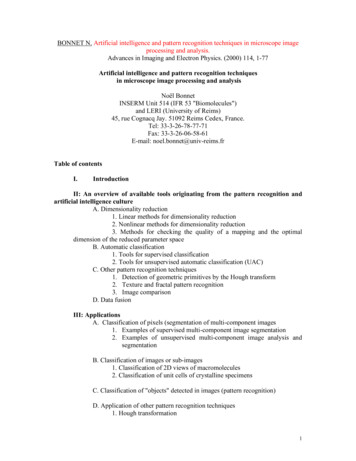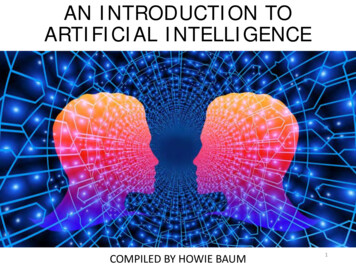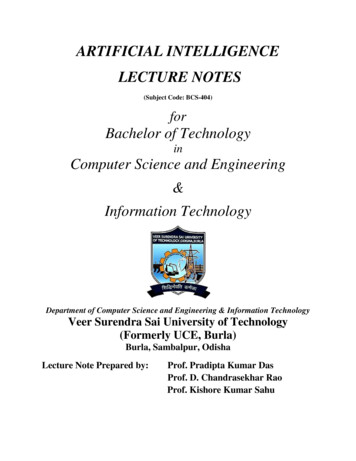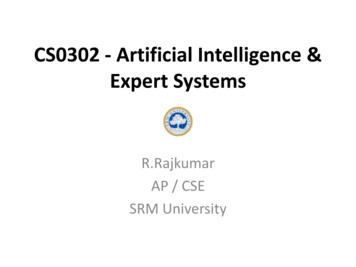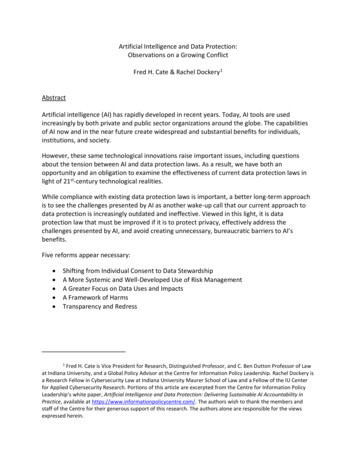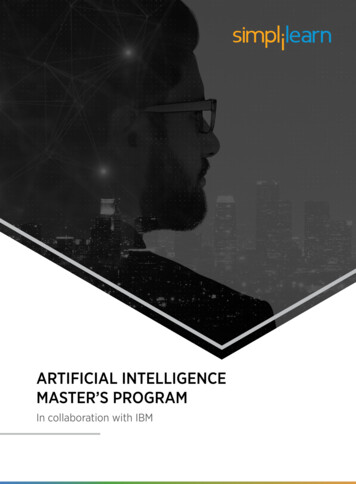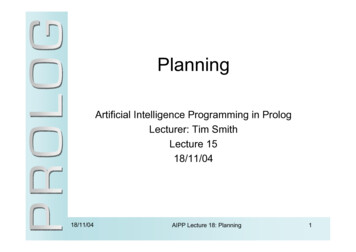
Transcription
AI and youPerceptions of ArtificialIntelligence from the EMEAfinancial services industryApril 2017
AI and you Perceptions of Artificial Intelligence from the EMEA financial services industryExecutive Summary1What is Artificial Intelligence?2Seamless AI: the true challenge to humankind5How far are we now?7What’s new in FS world?14Wrap up18Sources19Contacts20About us212
AI and you Perceptions of Artificial Intelligence from the EMEA financial services industryExecutiveSummaryLeaders of financial services institutions are concernedand excited about the business implications of ArtificialIntelligence. Firms across the globe are becomingaware of the power of these technologies and arenow starting to explore how AI could enable themto introduce new services to market, widening andempowering their offering, and to improve existingbusiness and operational capabilities.In this paper, based on an EMEA FSI survey conductedjointly by Efma and Deloitte, we aim at inspect theindustry sentiment about Artificial Intelligence andexplore the possible and current applications that mayimpact the industry, enhancing its productivity.Using the insights and case studies from several firmswithin the industry, this paper identifies what is shapingAI thinking in Financial Institutions, the current stateof the industry and the actions that will be required tounderstand and exploit this exponential technology.1
AI and you Perceptions of Artificial Intelligence from the EMEA financial services industryWhat is Artificial Intelligence?Demystifying AIArtificial Intelligence (AI) refers to technologies capableof performing tasks that normally require humanintelligence1. AI applications such as video suggestions,product recommendations, spam filters and navigationsystems have already become part of our day-to-daylives.In 1950, Alan Turing envisioned AI as algorithms thatare able to emulate human intelligence. The first AItechnologies were commercially available in the 1980s2,although they are only now beginning to achievecommercial relevance due to the exponential growthof data and connected devices, smarter algorithms,such as Deep Learning, and faster processing throughthe use of Graphics Processing Units (GPUs) and cloudcomputing.AI can be described in terms of three applicationdomains: Cognitive Automation, Cognitive Engagement,and Cognitive Insight.Artificial Intelligence domains3Cognitive InsightsCognitiveAutomationDeloitte - 2017 Tech TrendsDeloitte University - Demystifying artificial intelligence3Deloitte LLC framework122CognitiveEngagement
AI and you Perceptions of Artificial Intelligence from the EMEA financial services industryFocus on CognitiveAutomationIn this first AI domain are machine learning, RoboticsProcess Automation (RPA), and other cognitive tools todevelop deep domain-specific expertise (for example,by industry, function, or region) and then automaterelated tasks. We are already seeing AI-powereddevices that automate jobs traditionally performed byhighly trained human workers.Handwriting and character recognition are bestexamples of intelligent automation capabilities whichcan enhance back/middle office operations performinghigh volume and rules based work helping to reducerisk and cost. For example natural language processingcan be used to extract key information withindocuments using OCR scan.Focus on CognitiveEngagementAt the next level of the AI value tree lies the cognitive‘agents’: systems that employ cognitive technology toengage with people.Cognitive Systems unlock power of unstructured data(industry reports / financial news) leveraging text/image/video understanding, offering a personalizedengagement between banks and customers withpersonalised product offerings and unlocking newrevenue streams.The most common examples are the voice recognitioninterfaces that answer to voice commands to lower thethermostat or turn the television channel. Yet, thereare business tasks and processes that could benefitfrom this kind of cognitive engagement, and new fieldsof application are emerging. They will likely be able toprovide access to complex information, perform digitaltasks such as admitting patients to the hospital, orrecommend products and services. They may offereven greater business potential in the area of customerservice, where cognitive agents could potentiallyreplace some human agents by handling billing oraccount interactions, fielding tech support questions,and answering HR-related questions from employees.Focus on Cognitive InsightsCognitive Insights refer to the extraction of conceptsand relationships from various data streams togenerate personalized and relevant answers hiddenwithin a mass of structured and unstructured data.Observations and predictions’ accuracy is improvedin time with the increasing volume of processeddata. AI can provide deep, actionable insights intonot only what has already happened but also whatis happening now and what is likely to happen next.This can help business leaders to develop prescribedactions and help workers augment their performances.For example, in call centers around the globe, theservice representatives use multifunction customersupport programs to answer product questions, takeorders, investigate billing problems, and address othercustomer concerns. In many such systems, the workersmust now jump back and forth between screens toaccess the information they need to answer specificqueries.In summary, Cognitive Insights allow to detect realtime key patterns and relationships from large amountof data across multiple sources to derive deep andactionable insights.3
AI and you Perceptions of Artificial Intelligence from the EMEA financial services industryAI capabilitiesFocus on AI enablers andtechnologiesHuman intellect is mimicked by computer systems thatcan recognise and understand, identify semantics,apply context and interact, reason and make decisions,learn and improve.AI enablers and technologies allow machines toperform specific capabilities mentioned above. Theyinclude machine learning, deep learning, RoboticsProcess Automation (RPA), natural language engines,probabilistic inference, semantic computing, etc.Artificial Intelligence capabilities 4 Machine learning refers to the process ofautomatically discovering patterns in data.Computer systems have the ability to improve theirperformance through data exposure without theneed to follow explicitly programmed instructions. Deep learning: Machine learning algorithmsinvolving artificial neural networks that areinspired by the structure and function of the brain.Interconnected modules run mathematical modelsthat are continuously tuned based on results fromprocessing a large number of inputs. Robotic Process Automation (RPA) refers tosoftware robots (or bots) that can perform routinebusiness processes by mimicking the ways in whichpeople interact with software applications. Natural language engines include Natural LanguageProcessing (NLP) and Natural Language Generation(NLG). It enables interactions with humans in naturallanguage, voice, and text by using natural languageprocessing on structured and unstructured data.AI technologies employ technology and algorithmsto automatically extract concepts and relationshipsfrom data, understand their meaning, and learnindependently from data patterns and priorexperience. Recognise and Understand: AI enables machinesto recognize and understand handwriting, text, voice,image and video data using natural language engines,semantic computing, predictive algorithms, andmachine learning. Identify Semantics: AI enables machines to applysemantics to understand the meaning of wordsbased on contextual information. Apply context and Interact: AI enables to provideinformation that is situation-aware and reflectsrelevant data associations based on computingresults from different sources and models. Reason and Make Decisions: AI enables a standardthought-process that could be customized to reasonand make decisions based on specific environments. Learn and Improve: AI enables to continuously learnand improve performance based on results andfeedback received.4Deloitte LLC framework4 Probabilistic inference: AI capabilities that usegraph analytics and Bayesian networks to identifyconditional dependencies of random variables. Semantic computing: AI category that includescomputer vision, voice recognition, and varioustext analytics capabilities to understand naturallyexpressed intention and the semantics ofcomputational content.Structure of the reportDespite its potential benefits, AI is still at an earlystage of implementation; its potential impact anduse cases are further explored in the followingsections. This report aims to present a point of viewabout perceptions of AI from the EMEA FinancialServices Industry (FSI). First of all, main challengesand implications associated with AI will be discussed.Afterwards, the results of this survey will be presentedwith a description of the current situation. Then, AIuse cases and applications in the FSI will be described.Finally, a conclusion will present the main outputs andactionable insights.
AI and you Perceptions of Artificial Intelligence from the EMEA financial services industrySeamless AI: the truechallenge to humankind2016 was described by Microsoft CEO Satya Nadella as“the year of the bots”5. Advances in speech interfacesusing Natural Language Processing (NLP) algorithmscombined with the exponential growth of investmentsin AI start-ups lead to an increase of the buzzaround the “rise of the robots”6. The buzz was fed bycomments from prestigious scientists and innovatorslike Stephen Hawking, Bill Gates and Elon Musk7 withstark warnings about the dangers of AI. In contrast tothe more fantastical predictions and fear messages for5678AI in the popular press, the AI experts from Stanfordconcluded that there’s no cause for concern that AI isan imminent threat to humankind8.Nevertheless, the disruptive effects of AI should not bediminished. AI has the capability not only to augmentbut also to replace a wide range of tasks that areusually executed by humans. Moreover, questionsrelated to regulation, accountability and liability remainlargely unanswered.Why 2016 is shaping up to be the Year of the Bot, O’Reilly, 2016Rise of the robots, Martin Ford, New York Times Bestseller, 2015Stephen Hawking, Elon Musk, and Bill Gates Warn About Artificial Intelligence, Observer, 2015Artificial Intelligence and life in 2030 – One Hundred Year Study on Artificial Intelligence, Stanford University, 20165
AI and you Perceptions of Artificial Intelligence from the EMEA financial services industryWe already observe that AI technologies are becomingembedded in our daily lives and part of diversebusiness functions. Thus, economy and society in abroad sense need to face the disruptive impact of AI ina short-term. We already see doctors getting insightsand assisted diagnoses from AI algorithms9.We are using AI algorithms to detect fraud andcustomer behaviour patterns to get risk advisory andto enhance cross-sell techniques9, 10, 11 in banking andretail. Even in oil and gas production, AI algorithmsare applied to locate mineral deposits and diagnosemechanical problems with drilling equipment9. Beyondthe undoubtable benefits of cost saving created byautomation and increase of efficiency in operationsand complex tasks, AI solutions: Improve and fasten decision making by deriving deepand actionable insights (e.g. customer behaviourpatterns, automated fraud detection and planning). Boost customer engagement by creating customizedand intelligent products and services, with newfeatures, more intuitive interactions (e.g. speech) andadvisory skills (e.g. personal financial management). Allow greater scale, through the automation of tasksthat were executed manually 9.According to the Stanford study “Artificial Intelligenceand Life in 2030”8, the eight domains where expertspredict that AI will play an even more significantrole are: transportation, service robots, healthcare,education, low-resource communities, publicsafety and security, employment and workplace,and entertainment7. On the other hand, the U.S.Department of Labour reported in 2016 that “65% ofthe schoolchildren will be eventually employed in jobsthat have yet to be created”. These predictions tell usthat in near future the presence of AI technology will bealmost seamless in our lives influencing both actionsand jobs12.7The following question arises: “how to prepare theeconomy and society for a bright AI future?”In early 2017, the European parliament reacted byproposing a set of regulations to govern the use ofAI, to settle issues regarding compliance with ethicalstandards and liability for mistakes made by thosetechnologies.Rapporteur Mady Delvaux stressed the importance ofcreating an European Agency for Robotics that wouldsupport public authorities by providing technical andethical assistance13. He also suggested to draft a Codeof Ethical Conduct to guide robots engineering andto determine accountability for their actions. In fact,accountability, or liability, is one of the crucial points inAI debates. The rise of self-driving cars stands out asthe clearest example; it is necessary to define specificinsurance schemes and determine responsibility fordamages. In the next future, smart autonomous robotswill be granted some sort of “legal personhood”14, notunlike any firm. Finally, Delvaux’s report highlighted thatrobots are likely to have long-term impacts on societyas a whole. Public authorities are called to keep an eyeon these trends and to start creating new employmentand tax models.We envision an economy and society that willharvest many positive and profound impacts from AItechnologies. Nevertheless, researchers, developers,social scientists and policymakers play now animperative role to drive innovation into the rightdirection, through the creation of AI-related policy,education and production of reliable and safe AItechnology that public can trust.Stephen Hawking, Elon Musk, and Bill Gates Warn About Artificial Intelligence, Observer, 20158Artificial Intelligence and life in 2030 – One Hundred Year Study on Artificial Intelligence, Stanford University, 20169Cognitive Technologies: The real opportunities for business, Deloitte University Press, 201510There is a blind spot in AI research, Nature, 201611Watson Marketing gives banks a competitive edge, IBM White paper, 201612The future of work, U.S. Department of Labor report, 201613European Parliament News, ”Robots :Legal Affair Committee calls for EU-wide rules” -for-eu-wide-rules14The Guardian, “Give Robot Personhood Status, EU Committees argues”, /giverobots-personhood-status-eu-committee-argues6
AI and you Perceptions of Artificial Intelligence from the EMEA financial services industryHow far arewe now?In order to better understand the present sentimentand future vision of the FS Industry on ArtificialIntelligence technologies, a large survey was launchedin February 2017. This survey involved over 3,000people across EMEA and was conducted jointly by Efmaand Deloitte. The program focused mainly on C-levelexecutives on both technical and business sides ofFinancial Services firms. The collection of the surveyanswers was carried out online, following a first emailcontact.7
AI and you Perceptions of Artificial Intelligence from the EMEA financial services industryOne of the first questions that was asked was aimed at understanding the level of knowledge of the matter andthe reputed potentialities seen in it. Indeed the results show that Eastern Europe was late in receiving informationon cognitive technologies, but it had a rapid development anyway. In general respondents from Eastern countriesalso believe in a greater industry disruption as a consequence of further cognitive implementations. On the otherhand, Southern Europe exhibits fewer implementations despite early exposure to AI technologies.When did you hear about the term Artificial Intelligence for the first time?6%3%6%5%3%Northern &WesternEuropeIn 2014 or before5%Northern &WesternEuropeIn 2014 or before20152015EasternEasternEuropeEuropeFirst half 2016Firsthalf 2016SouthernEuropeSecond half 2016SouthernEuropeSecond half 201686%086%2040060208040100608010080100How disrupted do you think your world will be by Artificial Intelligence?6%Not disrupted6%%Not disruptedPart of our business /Partchainof our willbusinessvaluebe /value chain will bedisrupteddisrupted37%46%11%Northern &WesternEurope11%46%Northern &WesternEuropewholebusinessbusiness willOurOurwholewillbe disrupted / highlybe threateneddisrupted / EuropeSouthernEuropeOur whole industryis highlyOurecosystemwhole industryimpacted0ecosystem is highlyimpactedAlmost half of the respondents to our survey believethat cognitive related technologies will hit the peak in 2to 5 years.200406020804010060When do you think Artificial Intelligence will be mainstream?9%3%14%0 - 18 months18 months - 2 years43%31%2 - 5 yearsLaterNever8
AI and you Perceptions of Artificial Intelligence from the EMEA financial services industryMore than half of the survey respondents’ firms have already identified an AI leader within theircompany. Whithin the firms that have appointed an AI leader, half of them have appointed the head ofinnovation as AI leader.Who is the Artificial Intelligence leader in your company?26%Head of innovation45%45%55%55%55%Not AppointedNot Appointed45%Not %3%9%of innovationHead of innovationHead 26%CIOCIO12%CTO5%COOCOOCOO3%text)Other (free text) Other (free9%Other (free text)CIOCTO CTO9%Moreover about 9 companies out of 10 have already started working with AI technologies. EasternEurope in particular, which was late in receiving information on cognitive technologies, had a rapiddevelopment anyway. On the other hand, other EMEA areas, especially Southern Europe, seem to bemostly in a learning phase.Where are you in the Artificial Intelligence journey?1%11%1%1%We have not yet startedWe have not yet started11%LearningNorthern &WesternEuropeLearning31%Northern &WesternEuropeInvestmentstart-upsInvestment inin boration inin group/Collaborationgroupmarket initiativesmarket initiatives/Build solutionBuild solutionFully functioning centerof 602080401006080100Fully functioning centerof excellence9
AI and you Perceptions of Artificial Intelligence from the EMEA financial services industryTop 6 biggest concerns about Artificial Intelligence by phase of the journeyHacking / cybercrime12%19%Scarcity of technical talent12%8%Limited understanding ofdata technology12%15%Sustainability9%Existential threat to humanity9%No ownership / %Multiple answers allowedWhere are you inthe ArtificialIntelligence journey?TOTALNOT YETSTARTEDLEARNINGMATURING(START-UP /GROUP INITITIVES)DEVELOPING (BUILDSOLUTION / CENTREOF EXCELLENCE)100%11%40%17%32%This may due to some concerns that come out when thinking about AI, going from data security (cybercrime),organizational impacts (need for talent and necessity to re-allocate people), technology implementation, loss ofcontrol and sustainability.Data highlighted that the more a firm is in an advanced phase of cognitive technology implementation, the moredifficult it is to find the right talents. This probably because in a more mature phase, there is a stronger need forhighly trained specialists, with specific skills, while, during the initial stages, a general knowledge is enough.Another important fact is that, in the initial phase, the main obstacle to the implementation of Cognitivetechnologies identified is a lack on the organizational side.10
AI and you Perceptions of Artificial Intelligence from the EMEA financial services industryThis links to another important topic related to AI. Manypeople worry that intelligent software may steal jobsaway from human operators.Which of the following types of influences do you think AI will have onhuman work?However, 91% of the survey respondents believe thatthe new Cognitive technology will either empower orsupport employees, rather than replace them.Replace work (these technologieswill totally or significantly replacehuman work, leading to massiveunemployment)9%29%62%Relieve work (take over tasks thatworkers don’t relish or areover-qualified for)Empower work (make workersmore effective and help them tocomplete tasks before unworkable)Most organizations need to make external hires tofill the AI skill gap. However, most of them have hardtimes hunting the right talents. Therefore, there aregreat investment opportunities in the field of the futureworkforce education.Especially in Southern Europe, consultancy firms aremore well-disposed to broaden their commercial scopeby collaborating with innovative FinTech players.How will you develop your Artificial Intelligence use case?5%5%23%26%Ask for consultants bringingfunctional and technicalknowledgeSeek technical AI experts toassistBase on internal capabilitiesFurther advantage may come from employing highlyqualified professionals.26%15%Partner with FinTechsContribute to group/marketinitiativesOther11
AI and you Perceptions of Artificial Intelligence from the EMEA financial services industryAs for the application interests, it seems that different industries are looking for different technologicalsolutions. Therefore, it is necessary to diversify the technological offer in order to expand the marketshares and reach out more consumers’ needs.In which part of the value chain do you see the Artificial Intelligence use case you developed apply withthe greatest impact?Customer serviceBack office / operationsFinancial Advisors65%Back office / operations52%Risk Management42%Financial DetectionFraud detection31%Customer serviceRisk Management29%Compliance78%56%56%44%22%Multiple answers allowedBANKING12INSURANCE
AI and you Perceptions of Artificial Intelligence from the EMEA financial services industry“Some cognitive technologyvendors and customers aremoving past the “scienceproject” phase and using artificialintelligence (AI) to transformbusiness processes. Now is thetime for businesses to considerthe areas suitable for AI andhow they can help transform keyprocesses.”Tom Davenport15This is how Professor Tom Davenport, Senior Advisorat Deloitte US, described cognitive technologyevolution in late 2015. Since then, the wave ofcognitive innovation has left the American shore andlanded overseas. As our analysis shows, 86% of therespondents had heard about Cognitive technologiesby 2014. This fact points out that AI is shifting froma garage-built nerdy idea to an actually applicablebusiness application.Some may worry that intelligent software may stealjobs away from human operators. However, as alreadypointed out by data, most of the survey respondentsbelieve that the new Cognitive technology will empowerand relieve work, rather than replace human workforce.In fact, for example, the so-called Cognitive assistantswill be able to benefit not only customers, but alsoemployees who will get rid of repetitive tasks.Despite the quick rise to popularity, cultural andorganizational obstacles still stand in the way of AIimplementation. In order to gain companies’ trust, AIleader must understand that there is no one-size-fitsall solution. Some players may be on the lookout formassive opportunities only, while others favor gradualactivations. As an example, from our survey it standsout that a broad set of possible use cases exists. Itis possible to aim for ground-breaking AI-poweredcustomer services or settle for less risky solutions suchas automated back-end processes.Needless to say, there is no such thing as a correctapproach. Many might wish for a mixed portfolio,embarking on both bold journeys and mildpromenades.“Some companies are aiming atdramatic results such as findinga cure for cancer using cognitiveapplications, while others arefocusing on more prosaic areassuch as billing. What's the correctapproach? “Tom Davenport17“Cognitive assistants already set your sleep alarm, turn down yourthermostat at night, and tell you what movies are playing at the mall.And, as a new generation of personal, social robots is introduced toconsumers in the next few years, they are likely to play a larger role incustomer support as well.”Tom Davenport, Rajeev Ronanki1615Deloitte University Press, “Cognitive technologies all set to transform business processes”, ness-processes.html16Deloitte University Press, “The rise of cognitive agents”, al-intelligence-applications.html17Deloitte University Press , “Cognitive applications: Home runs versus base hits” or-base-hits.html?id us:2el:3dc:dup3174:awa:dup:essay:dcpromo13
AI and you Perceptions of Artificial Intelligence from the EMEA financial services industryWhat’snew in FSworld?The FSI industry future trends can be summarised below18:Introduction and majortrends in FSIThe Financial Services Industry (FSI) evolves rapidlyand is profoundly affected by major trends such asthe Digital transformation, the exponential growthof data volume, new players entering the marketplace and increasing regulatory pressures. The Digitaltransformation revolutionizes customer experiencewith the use of the mobile channel throughoutcustomer journeys.Large amount of structured and unstructured data iscontinuously generated by multiple systems internallyor externally. New players such as FinTechs and Startups are entering the market place with innovativesolutions to solve complex issues. Increasing regulatorypressures bring new challenges, such as GDPR (GeneralData Protection Regulation) will limit usage of personalcustomer information and significantly change privacyrules by strengthening the rights that individuals haveto control their own data.ASharing EconomyBInternet of ThingsAutonomous VehiclesAdvanced SensorsDigital DistributionWearable ComputerSecuritization & Hedge FundsCP2P LendingDAlternative adjudicationVirtual TechnologiesMobile 3.0Third party APIEVirtual ExchangesCrowdfundingAlternative due diligenceFAdvanced AlgorithmsGAutomated Advice & managementCloud computingSocial TradingCapability SharingRetail algorithmic tradingOpen Source ITHArtificial Intelligence /Machine LearningIMarket Automation PlatformsAutomated data collection &analysisMachine readable newsSocial SentimentBig Data18World Economic Forum Report: “The Future of FinancialServices: How disruptive innovations are reshaping theway financial services are structured, provisioned andconsumed”, in collaboration with Deloitte Touche TohmatsuLimited14JCrypto CurrencyMobile MoneyKP2P FXIntegrated BillingMobile PaymentsStreamlined payments
AI and you Perceptions of Artificial Intelligence from the EMEA financial services industryOverview of AI applicationsin the FSIFocus on the InvestmentManagement sectorArtificial Intelligence (AI) influences almost all industriesand especially the FSI that encompasses InvestmentManagement, Banking and Insurance. Advances in AIopen new horizons for the FSI, numerous AI-basedapplications are already implemented and newinnovative solutions have the potential to changebusiness activities from operations, risk, finance,to compliance. AI-based applications in the FSIencompass robo-advisors, pattern recognition, virtualagents and intelligent automation.In the Investment Management sector, companiesalready implemented AI solutions and some nicheplayers developed robust AI capabilities. In the HedgeFund sector, companies deployed latest advancesin data science and machine learning to developcomplex quantitative investment strategies basedon mathematical and statistical methods to produceoutstanding results in the financial markets.We divide the AI applications into three main pillars: Robo-advisors enable to build automatedreal-time portfolio allocation and investmentrecommendations tailored to individual clients byleveraging on client information and algorithms.The digital investment start-up Betterment,specialised in robo-advisor, announced morethan 195,000 customers and surpassed 6 Billionin assets under management19. The proprietarytrading platform allows to automate transactionsand portfolio allocation including fractional sharetrading, automatic rebalancing, and smart dividendreinvestment in order to optimize transactionalactivities.Cognitive Engagement: cognitive agents use cognitivetechnology in order to interact with users in naturallanguage, understand the meaning of the data theyreceive and conduct actions on behalf of the users’.Usually those kind of applications are various types ofchatbots.Cognitive Insights: Artificial Intelligence algorithmsthat perform data analysis. Algorithms can providecognitive insights out of huge amount of data sets.Cognitive insights agents can help enterprises withdeep, actionable visibility into not only what has alreadyhappened but what is happening now and what is likelyto happen next.Cognitive Automation: Cognitive automation enablesmachines to replicate human actions and judgmentwith robotics and cognitive technologies.AI advances bring new opportunities for theInvestment Management sector: Intelligent algorithmic trading (algo-trading)enables high-frequency trading through adaptivepattern recognition and real time processing oflarge amount of informati
6 Rise of the robots, Martin Ford, New York Times Bestseller, 2015 7 Stephen Hawking, Elon Musk, and Bill Gates Warn About Artificial Intelligence, Observer, 2015 8 Artificial Intelligence and life in 2030 – One Hundred Year Stu
